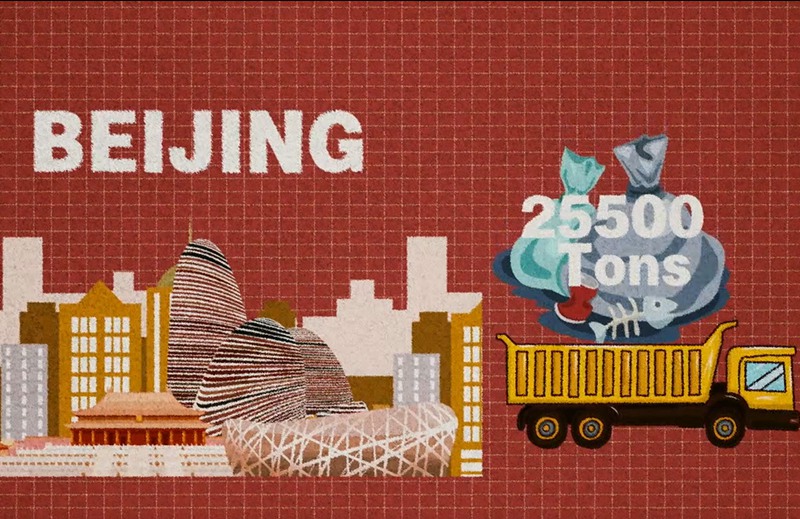


From the world’s largest garbage importer to a country with stringent garbage management rules, China’s green crusade has advanced significantly in 2019. Launching a ban on importing solid waste in 2018, China has phased out such imports to halt by the end of 2019, while Shanghai, the country’s economic hub, has already launched new rules to promote waste management.
Please follow today’s This Year In One Minute, to see how China has strived to safeguard the environment and public health.
Once a wasteland
First importing solid waste as a source of raw materials in the 1980s, China was the world’s largest importer of garbage for decades, despite its weak capacity in garbage disposal.
According to statistics, most waste generated by western countries ended up in China. A total of 87 percent of Europe’s waste plastic, for example, was sent to China for recycling. Fifty-six percent of global plastic waste was exported to China, and even developing countries, such as Vietnam, Indonesia and Malaysia, re-exported reprocessed imports and domestically collected plastic waste to China. This meant that China had been importing around 8 million tons of foreign waste annually for the past three decades.
Solid waste posed a significant threat to both the environment and public health, as many companies profited by illegally importing foreign waste into China, while countless workers risked their health dealing with hazardous garbage, including medical and chemical waste.
In an effort to tackle the country’s waste problem, China announced that it would ban imports of 32 types of solid waste from Dec. 31, 2018, including hardware, ship parts, auto parts, titanium, wood, stainless steel waste and scrap.
Due to the effective ban, China’s scrap imports plunged in 2019. According to statistics from China’s General Administration of Customs, the country’s solid waste imports equaled 9.7 million tonnes during the January-August period, down 29 percent year-on-year, while in August alone, imports of plastic, paper and metal waste totaled 1.15 million tonnes, down from 1.26 million tonnes in July.
The country has also vowed to cut permitted waste imports to 18 types by the end of 2019, down from 66 in 2017.
Stringent waste management rules
As the world’s second-largest producer of municipal solid waste, an effective recycling regimen has long been overdue in China. In 2017, the central government announced waste sorting plans, in a bid to recycle 35 percent of waste in 46 major cities, including its economic hub, Shanghai, by 2020.
Compared with its foreign counterparts, Shanghai’s recycling rate is much lower. According to statistics, incineration accounts for about 36 percent of Shanghai’s domestic waste treatment, landfill around half, and recycling less than 10 percent. The figures for London, on the other hand, are 40, 30 and nearly 30 percent, respectively, with Tokyo registering about 75, 3, and 20 percent.
To further improve its recycling rate, as well as educate its citizens, Shanghai passed a law to become the first Chinese city to adopt a mandatory waste classification, to go into effect in July.
The rules, stringent and new to the Chinese public, received mixed reactions. Garbage has been divided into four categories, namely recyclables, perishables, hazardous materials and residual. Easy as it sounds, the rules can be confusing. For instance, the shell of a hairy crab is perishable, but king crab shells are residual.
Many citizens have complained about the confusing rules, despite volunteers being deployed at every bin to help them sort their garbage. Rule breakers face harsh fines, from $7 to $30 for not sorting trash properly, while penalties for companies can reach $70,000. Even a new door-to-door garbage collection and disposal service has emerged, with professionals helping you deal with garbage for as little as $2.
Inconvenient as it may sound, the new rules have improved the city’s waster management rate. As of November, over 5,600 tonnes of recyclable garbage could be recycled daily in Shanghai, five times more than in 2018, while the figures for perishables and hazardous waste stood at 9,000 tonnes and 1.3 tonnes, 1.3 times and 5 times the respective 2018 numbers.
Following Shanghai’s lead, such waste management rules will be fully promoted in 45 cities in 2020, with Beijing planning to initiate its own version in May 2020.

 Award-winning photos show poverty reduction achievements in NE China's Jilin province
Award-winning photos show poverty reduction achievements in NE China's Jilin province People dance to greet advent of New Year in Ameiqituo Town, Guizhou
People dance to greet advent of New Year in Ameiqituo Town, Guizhou Fire brigade in Shanghai holds group wedding
Fire brigade in Shanghai holds group wedding Tourists enjoy ice sculptures in Datan Town, north China
Tourists enjoy ice sculptures in Datan Town, north China Sunset scenery of Dayan Pagoda in Xi'an
Sunset scenery of Dayan Pagoda in Xi'an Tourists have fun at scenic spot in Nanlong Town, NW China
Tourists have fun at scenic spot in Nanlong Town, NW China Harbin attracts tourists by making best use of ice in winter
Harbin attracts tourists by making best use of ice in winter In pics: FIS Alpine Ski Women's World Cup Slalom
In pics: FIS Alpine Ski Women's World Cup Slalom Black-necked cranes rest at reservoir in Lhunzhub County, Lhasa
Black-necked cranes rest at reservoir in Lhunzhub County, Lhasa China's FAST telescope will be available to foreign scientists in April
China's FAST telescope will be available to foreign scientists in April